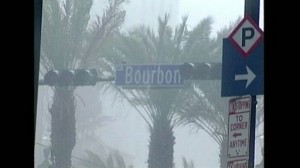Now is the time for every good man to come to the aid of his party, or at least to come in out of the rain. The only wind will be from the podium, since the mighty hurricane that terrified the Republican National Convention is tracking 350 miles west of Tampa. Only the prospect of getting wet is exciting.
And a good thing, too, since nominating conventions have long since passed their sell-by date. Mitt Romney wants to use the noise, synthetic excitement and manufactured buzz to give him the bounce that conventions have given nominees of the past.
 Maybe he’ll get his bounce, but Hurricane Isaac, at last count headed for New Orleans and the Mississippi Gulf coast in the very track of Hurricane Katrina (in 2005), threatens to steal the headlines and sound bites of Tampa. Life can be unfair.
Maybe he’ll get his bounce, but Hurricane Isaac, at last count headed for New Orleans and the Mississippi Gulf coast in the very track of Hurricane Katrina (in 2005), threatens to steal the headlines and sound bites of Tampa. Life can be unfair.
Most of the public-opinion polls call the presidential race dead even heading into this week in Tampa, with President Obama still holding a lead in prospective electoral votes – the only votes that count. But it’s a small lead, and fragile besides.
Ron Paul, who ever aspires to be the spoiler, is making his usual strange noises. That’s mildly interesting, but not exciting. He’s pouting because the Romney campaign, which owns the microphone, doesn’t trust him and wants to see his speech before he makes it. He has already said he doesn’t “fully endorse” Mr. Romney. In the old days he would have taken his snit to the convention hall. In the old days the nominee was selected by the convention and nobody knew, showing up with their convictions and funny hats, what might happen.
The primaries changed all that, and the conventions are but coronations. And only kings actually enjoy coronations. Everything is scripted at modern conventions. The Romney managers – like the Obama managers next week in Charlotte – can tell you the exact minute, down to the second, when they’ll drop the red, white and blue balloons. If they could, the managers would tape the proceedings and play them later, like a soap opera, figuring the audience wouldn’t know the difference.
I’ve attended nearly every convention since I went to Los Angeles in 1960 with neither a press pass nor the prospect of getting one. I was working on a newspaper in Memphis which couldn’t send me to Los Angeles, so I took a week’s vacation and hitchhiked to California. Once there I found an old friend who was the lawyer for the governor of Arkansas, who stood me to breakfast at the Los Angeles Hilton and said he would try to find a hotel room for me. “If I can’t, the governor’s sister lives in Long Beach and she’ll give you a bed.” He found me an hour later, wandering the lobby, and told me I was officially a delegate, with a room at the hotel.
Both John F. Kennedy and Lyndon B. Johnson came to our caucus (where I was regarded with considerable suspicion). I didn’t get to write a word but I got a bus ride to convention hall. I never got to cast a vote. The governor did that by remote control from Little Rock, and all for LBJ. I never was sure I was actually a delegate until I found my name in a document years later at the Kennedy Library in Boston, a small thrill cast in agate type.
I’ve attended 23 of the 26 conventions since, a member of the working press, and conventions became a little less exciting, a little less relevant each time, with only occasional small eruptions of relevance and consequence. The Barry Goldwater convention in San Francisco in 1964 was an early marker on the road to the conservative takeover of the Republican Party. Ronald Reagan almost ambushed Gerald Ford at Kansas City in 1976.
Nothing defined “zany” like the 1972 Democratic convention in Miami Beach, when prankish delegates put more than 30 names in nomination for vice president, including Roger Mudd, Mao Tse-tung (as he was known then), Martha Mitchell and even “Archie Bunker.” George McGovern stepped up to deliver his acceptance speech at 3 o’clock in the morning. The nation was fast asleep and never heard the best speech of the ’72 campaign.
All that was fixed with reforms the next year. Rules were written. Smoke-filled rooms were banished. No more FDR, Dwight D. Eisenhower, Harry Truman or John F. Kennedy, all cigar-smoke nominees. The primaries and “reformed” conventions have since given the parties the likes of Bob Dole and John McCain, Mike Dukakis and John Kerry.
So no Tampa for me. I’m off to New Orleans to watch the hurricane.
Wesley Pruden is editor emeritus of The Washington Times.


You must be logged in to post a comment Login